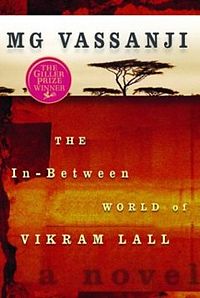Biography
Moyez G. Vassanji was born in Nairobi, Kenya in 1950 and raised in Tanzania. His family was part of a community of Indians who had emigrated to Africa. When he was 19, Vassanji left the University of Nairobi on a scholarship to the Massachusetts Institute of Technology where he studied nuclear physics in which he later earned a Ph.D at the University of Pennsylvania. After his Ph.D, he emigrated to Canada where he worked at the Chalk River atomic power station. In 1980, Vassanji moved to Toronto and began writing his first novel The Gunny Sack which was published in 1989. That year, with his wife Nurjehan Aziz, he founded and edited the first issue of The Toronto South Asian Review (TSAR). After the publication of The Gunny Sack, Vassanji began writing full-time and ended his career in physics. Studying Sanskrit and Indian philology prompted Vassanji’s career change. In an interview with Chelva Kanaganayakam, Vassanji said this of his decision to leave the field of physics:
It is the kind of thing you can keep on doing. I had reached a point when I could just churn out things. Unless you are at MIT or Harvard, or a place like that, you are not really at the forefront. Sometimes I miss that life because of the way of thinking it demands. My writing, however, is much more important. It seems to be the mission in life that I finally achieved. (34)

(See Nuclear Proliferation in the Third World, Murray Gell-Mann)
Vassanji has numerous novels, including: The Gunny Sack (1989), No New Land (1991), The Book of Secrets (1994), Amriika (2000), The In-Between World of Vikram Lall (2003), The Assassin’s Song (2007), The Magic of Saida (2012), and Nostalgia (2016). The Toronto South Asian Review has survived under a new name: The Toronto Review of Contemporary Writing Abroad, and has branched out into publishing. Vassanji won the Commonwealth Writers Prize in 1990 (best debut novel in the African region) for The Gunny Sack. He has also won the Giller Prize in 1994 and 2003, the Bressani Literary Prize, and the Harbourfront Festival Prize. He also has two short story collections: Uhuru Street (1992) and When She Was Queen (2005).
Themes
Vassanji’s work deals with Indians living in East Africa. Some members of this immigrant community later undergo a second migration to Europe, Canada, or the United Sates (See Transnationalism and Globalism). Vassanji is concerned with how these migrations affect the lives and identities of his characters, an issue that is personal to him as well: “[the Indian diaspora] is very important…once I went to the US, suddenly the Indian connection became very important: the sense of origins, trying to understand the roots of India that we had inside us” (Kanaganayakam 21). For example, in The Book of Secrets Vassanji focuses on the interaction between the Shamsi (Indian) community and the native Africans, as well as the colonial administration. Even though none of the characters ever return to India, the country’s presence looms throughout the novel. Vassanji himself has never been to India yet he sees himself “as an Afro-Asian.”
Another major concern of Vassanji’s is how history affects the present and how personal and public histories can overlap (Malak 279). The colonial history of Kenya and Tanzania serves as the backdrop for The Book of Secrets, but it is the personal history contained in the diary of a colonial administrator that fuels the story. While the narrator, a retired schoolteacher, reads the diary and attempts to trace the events that occur after the diary stops, he eventually finds himself revisiting his own personal history. Vassanji’s presentation of the past is never crystal clear: “the past in [The Gunny Sack] is deliberately murky to some degree. I did not see, nor wanted to give the impression of, a simple, linear, historical truth emerging. Not all of the mysteries of the past are resolved in the book. That is deliberate. It’s the only way” (Kanaganayakam 22).
See: Hybridity
Bibliography and Works Cited
- Contemporary Authors. “Vassanji, M(oyez) G.” Detroit: Gale Research Inc. Vol. 136: 433-4.
- Kanaganayakam, Chelva. “`Broadening the Substrata’: An Interview With M.G. Vassanji.” World Literature Written in English. 31, 2 (1991): 19-35.
- Malak, Amin. “Ambivalent Afflictions and the Post-Colonial Condition: The Fiction of M.G. Vassanji.” World Literature Today. 67, 2 (Spring 1993): 279-82.
- Vassanji, M.G. The Book of Secrets. New York: Picador USA, 1994.
- —. The Gunny Sack. London: Heinemann International, 1989.
- —. No New Land. Toronto: McClelland & Stewart, 1991.
- —. Uhuru Street. London: Heinemann International, 1991.
Author: Robert Hunt, Spring 1998
Last edited: May 2017